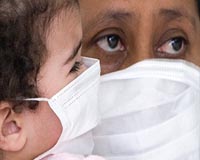| . |  |
. |
London (AFP) Aug 27, 2009 Britain and France have received their first batches of swine flu vaccine, officials said Thursday, as governments began to arm themselves against a second wave of the pandemic in the northern winter. The World Health Organization has been warning governments for months to brace for a resurgence of the A(H1N1) virus when the cold season hits the northern hemisphere. The doses to combat the pandemic arrived as millions of schoolchildren prepared to return to school in the next two weeks, with concerns that the virus could spread easily between classrooms. In South Korea, the education ministry announced that all elementary and secondary schoolchildren will have their temperature checked daily to combat the spread of H1N1 when they return to school next week. The recent discovery of an outbreak in Chilean turkey farms also raised concerns that swine flu could combine with avian influenza and become a more dangerous virus, a UN agency said. It is the first case of H1N1 among birds. British and French health officials said the H1N1 vaccine should win licensing approval for distribution in their countries by October. Britain's Department of Health said it received a first batch of 100,000 doses of swine flu vaccine, while France announced the arrival of a "limited quantity" of shots. Belgium said it would get its first doses next month. A British health department spokeswoman said the vaccine was delivered by US pharmaceutical company Baxter and that it could be approved for public distribution by early October "if everything is fairly straightforward". European Union experts said Tuesday that pregnant women, health workers and people with underlying health problems should receive swine flu vaccines ahead of the rest of the population. In Britain, the vaccine will initially be used on at-risk groups, such as people with asthma and diabetes, officials said. England's Chief Medical Officer Liam Donaldson said doctors he had spoken to want the vaccine as soon as possible before winter arrives. Britain is the European country hardest hit by the virus, which emerged in Mexico in April before escalating into a global pandemic. So far 66 people with the virus have died in Britain. Donaldson stressed that the vast majority of cases produce relatively mild symptoms, while adding: "It still remains the case that this disease is not a killer but it can kill." French Health Minister Roselyne Bachelot refused to disclose the type of vaccine or the number of doses her country had received, citing "security reasons". France has reserved 94 million doses of vaccine from four pharmaceutical companies, and expects to have several million doses by mid-October, when the vaccines are set to win market approval, Bachelot said. The French government called on regional authorities to have their free vaccination plans ready to activate on September 28. Up until now, France had included only laboratory-confirmed cases of the disease, recording a total of 1,223 cases since the start of the epidemic. But based on the number of visits to doctors across France, Bachelot said the number of new infections was now estimated at 3,000 per week. John Oxford, professor of virology at Britain's St Bartholomew's and the Royal London Hospital, said France could be heading for a tough winter. "Some countries in Europe will have it worse than others. France, for example, will have it worse than England. A lot of people have been infected in England, and they are not going to be infected all over again," he told AFP. The UN Food and Agriculture Organization also expressed concern after the discovery of swine flu in Chilean turkeys that the virus could become more potent if it manages to mix with bird flu. "The current H1N1 virus strain is a mixture of human, pig and bird genes and has proved to be very contagious but no more deadly than common seasonal flu viruses," the Rome-based agency said in a statement. "However, it could theoretically become more dangerous if it adds virulence by combining with H5N1, commonly known as avian flu, which is far more deadly but harder to pass along among humans," it said. Share This Article With Planet Earth
Related Links Epidemics on Earth - Bird Flu, HIV/AIDS, Ebola
 Pandemic virus could get nastier in year two: expert
Pandemic virus could get nastier in year two: expertParis (AFP) Aug 27, 2009 The swine flu is unlikely to become more virulent as it spreads through the northern hemisphere this winter, but could re-emerge a year later in a more deadly form, a top expert said Thursday. "We should get through the winter relatively easily, I don't think the virus will mutate before then," said John Oxford, a professor of virology at Britain's St Bartholomew's and the Royal London ... read more |
|
| The content herein, unless otherwise known to be public domain, are Copyright 1995-2009 - SpaceDaily. AFP and UPI Wire Stories are copyright Agence France-Presse and United Press International. ESA Portal Reports are copyright European Space Agency. All NASA sourced material is public domain. Additional copyrights may apply in whole or part to other bona fide parties. Advertising does not imply endorsement,agreement or approval of any opinions, statements or information provided by SpaceDaily on any Web page published or hosted by SpaceDaily. Privacy Statement |